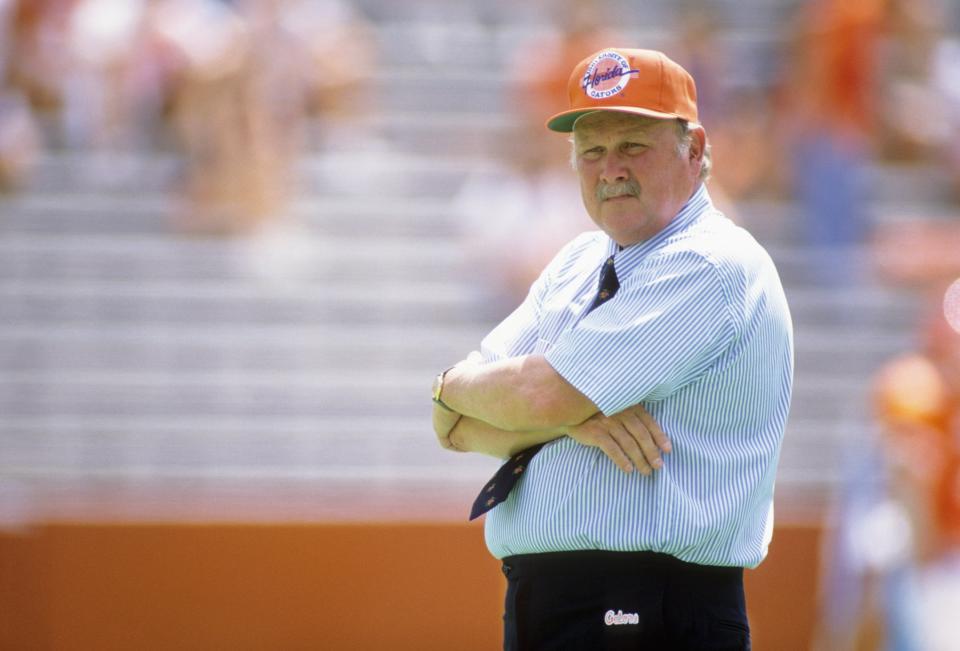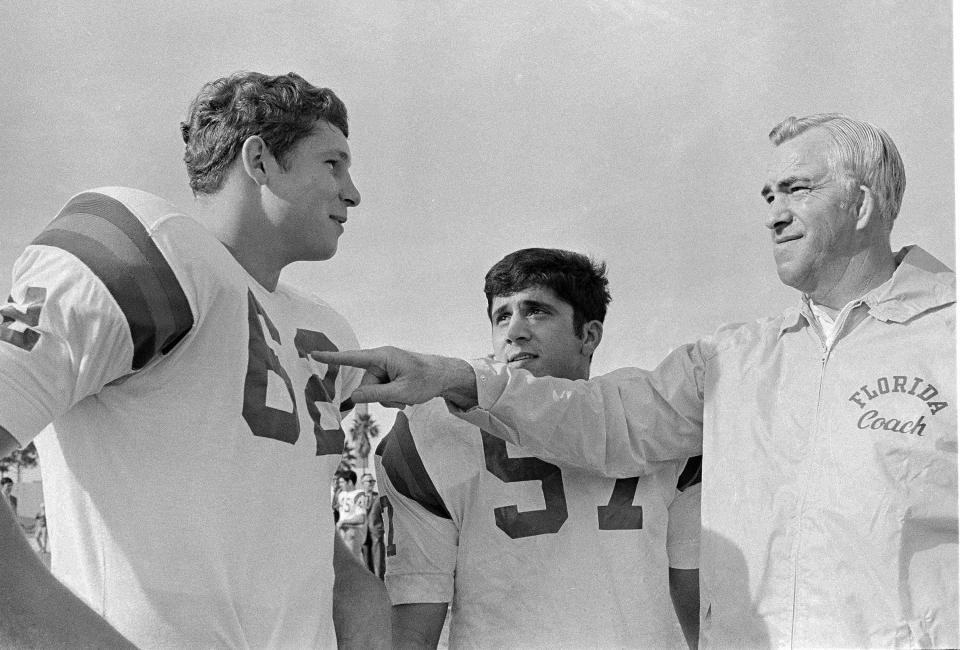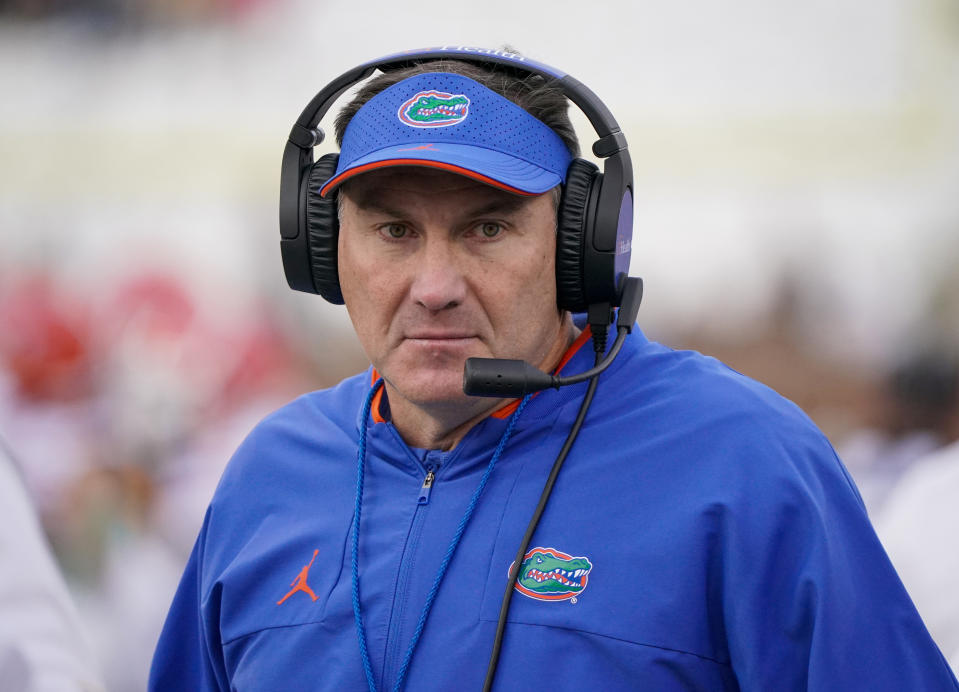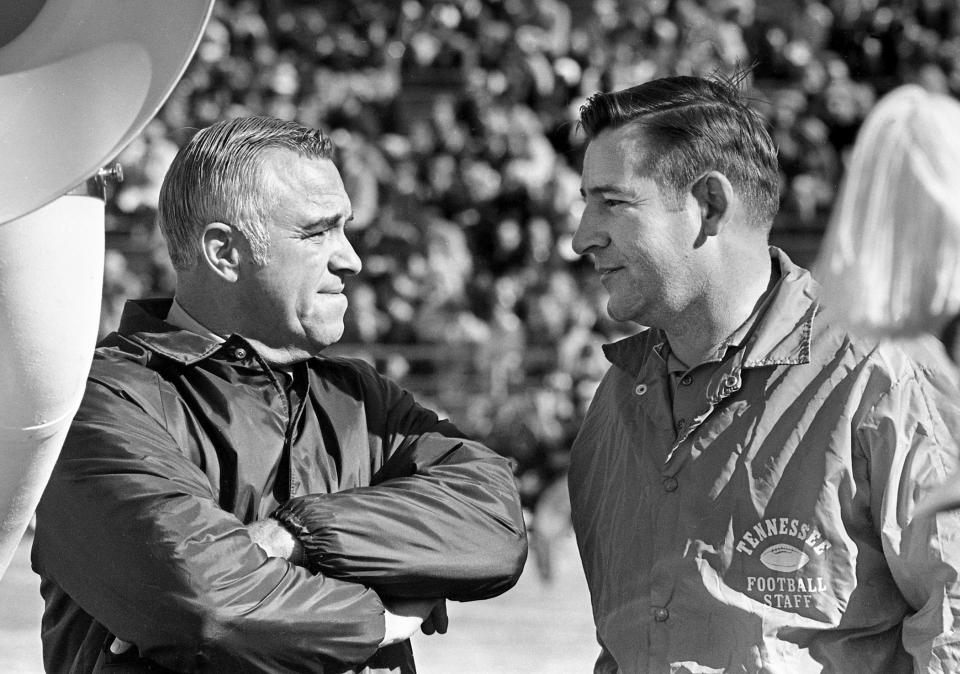Dooley’s Dozen: Best and worst coaching transitions in Florida football history

You always know that next year’s team will not be like last year’s team when it comes to college football. Sometimes, the impact is a player or two (think Percy Harvin) and sometimes it’s a mass exodus that makes you wonder if you will be able to field a team.
That is certainly the case as Florida moves into Year Two under Billy Napier.
Transitions aren’t always easy. Then again, there have been some in Florida football history that have been seamless.
In the latest Dooley’s Dozen, we rank the last 12 coaching transitions at the top of the Florida football food chain.
Galen Hall to Steve Spurrier

USA TODAY Sports
Spurrier has talked often about the incredible talent he inherited when he came here on New Year’s Eve in 1989. What he really needed to focus on was changing the mindset of the program.
He tells the story about a player coming to him about being excited about shaving the heads of all the freshmen. Spurrier wondered why. The player told him it was a tradition.
“So is getting your ass beat by Georgia,” Spurrier said. “We’re going to change some things around here.”
The freshmen follicles survived. Spurrier’s first two teams were the best in the SEC and then the SEC champs.
Ron Zook to Urban Meyer

Derick E. Hingle-USA TODAY Sports
Another example of it being more about changing culture. In this case, there was also the best recruiting class ever in Meyer’s second year.
He won nine games in his first year but was still working on the change in attitude, so much so that he threw two players off the squad during a loud team meeting on the plane on the tarmac after returning from a loss to South Carolina.
The next year, he won the national title. Of the 22 starters, 21 had been Zook recruits.
Meyer to Will Muschamp

Kim Klement-USA TODAY Sports
This was a transition that should have been better, but the entitlement problem took a full year to clean up. By year two, Muschamp nearly made it to the BCS title game.
That tells you the talent was there. But as Muschamp tells the story, president Bernie Machen was waiting for him on his first day of work to tell him to clean up the mess.
It started with Muschamp dismissing [autotag]Janoris Jenkins[/autotag] (who later said Meyer would never have done that) and a lot of struggles to get players in line with Muschamp’s fiery personality.
The transition looked pretty good in 2012.
After that, not so good.
Spurrier to Zook

Andy Lyons/Getty Images
Now, Zook would tell you that Spurrier didn’t leave him much to work with. Horse hockey. There were more than a dozen players who went on to have NFL careers. There was Rex Grossman, except that sometimes he called plays that weren’t in the new coaches’ playbook.
The players were there. Zook struggled with the shadow of Spurrier, but don’t forget that in his first two seasons he did win 16 games and went 12-4 in the SEC.
Gator fans would take that now.
Charley Pell to Hall

Allen Dean Steele/Getty Images
It might not have been the most comfortable transition when Pell was fired three games into the 1984 season, but it was just what Florida needed. The talent was overflowing (some of it gained illegally according to the NCAA) and Hall was just the guy to take over despite being in his first year with the program.
He was way less uptight in game-day situations and affable off the field. The players played loose and had consecutive 9-1-1 seasons.
But with the transition came sanctions that eventually made Florida retreat into mediocrity.
Bob Woodruff to Ray Graves

AP Photo/File
There will be some old school in this that you millennials will have to suffer through, but Woodruff left plenty of talent behind and Graves knew what to do with it. He went on to be the winningest coach ever at UF until Spurrier came along.
Graves definitely brought a different mindset to the game and Florida’s best players got better. The 1960 team – the first one for Graves – won nine games, including UF’s second-ever bowl win. After a second-year struggle, Graves never had a team win fewer than six games and two more win nine back in the days of 10-game seasons.
McElwain to Dan Mullen

Denny Medley-USA TODAY Sports
Here’s the thing – Mac left Mullen some great players. But there were a lot of holes. Still, that didn’t stop Mullen from going to three straight New Year’s Six bowls.
The best part of the transition was that Mullen brought in a fresh offense and it was effective. He was fortunate to catch some teams in their down cycles like FSU, but the first-year losses were not good.
Still, to win 11 games in Year 2 meant there were some studs left behind. The hiring itself was a little awkward, and the final season was abysmal, but McElwain was a pretty good recruiter.
Raymond Wolf to Woodruff

“We Beat Georgia!” (1950 yearbook, pg. 154) Courtesy: University of Florida SID
Things didn’t go well in Florida’s four seasons under Bear Wolf. He inherited a floundering program and it didn’t get any better with no winning seasons.
Along came Woodruff in 1950 with his Robert Neyland pedigree and a salary that was more than the president of the school (unheard of at UF at that time). His first team won five of its first six and his second team won at Alabama. By the third year, he was winning eight games.
Muschamp to Jim McElwain

Kim Klement-USA TODAY Sports
Now, McElwain would tell you that he had no offensive linemen and couldn’t even have a spring game. And I do accept that Muschamp did not get offense.
But there were enough players to start 6-0, win the SEC East his first two years and beat Georgia both years as well. Muschamp had stocked the team with SEC defenders and who knows what that team could have done if [autotag]Will Grier[/autotag] didn’t get popped.
Graves to Doug Dickey

Doug Dickey (R). Syndication: Nashville
This one wasn’t all about talent because the Super Sophs were back. But Florida had lost so many great seniors from that 1969 team and it showed.
Moreso, it was about the players feeling let down by Graves leaving and Florida bringing in a coach that Florida has just defeated in a bowl game. Then, Dickey made the offense so pedestrian it was hard to watch. It was a really bad transition because the players had so much trouble buying into the new coach.
Dickey to Pell

AP Photo
Dickey was fired not just because of his record (10-11-1 the last two seasons), but because he had lost control of the team. That’s what Pell inherited and it was on display in 1979 when Florida had its infamous 0-10-1 season.
Now that’s a bad transition year.
Pell had his own purge after the season. Players on the team called it “the Charley Pell Fire Sale.” They reported for camp in 1980 and wondered where everyone had gone.
But Pell was recruiting hard and had the 8-4 season in ’80. He didn’t only change the culture of the players but of the fans. They had to get on board.
Mullen to Napier

Christopher Hanewinckel-USA TODAY Sports
Mullen’s last two defenses were awful. And since Napier wanted to spend a year getting an idea of what he had, the defense was historically bad this season.
We all know the stories about how recruiting was in the tank and we saw it for the second year in a row. The team that quit in 2022 was just not talented enough to win enough games and bad enough to lose to all three rivals, plus Vanderbilt plus and an embarrassing bowl loss.
There is a reason for the purge and so many players just leaving. It has been an uncomfortable transition.
[listicle id=98794]
[listicle id=98520]
[listicle id=98355]
Follow us @GatorsWire on Twitter and like our page on Facebook to follow ongoing coverage of Florida Gators news, notes and opinions.
Let us know your thoughts and comment on this story below. Join the conversation today!

